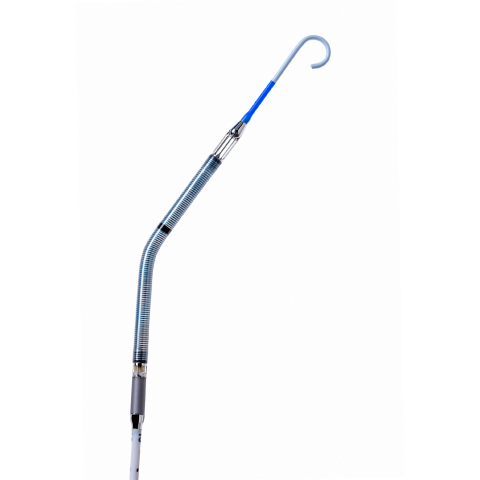Impella Advances to Higher Level of Recommendation in Newest ESC Guidelines
The 2021 guidelines of the European Society of Cardiology (ESC) elevate the recommendation for Impella heart pumps from Class IIb to Class IIa for treating patients in acute heart failure and cardiogenic shock. This update, the first in five years, reflects strong clinical evidence supporting Impella use in high-risk PCI and enhances its application to patients with mildly reduced left ventricular ejection fraction. The guidelines further emphasize mechanical circulatory support's role, particularly in unloading VA-ECMO patients.
- Escalation of Impella recommendation to Class IIa enhances market position.
- Growing clinical evidence supporting Impella's effectiveness in high-risk PCI and cardiogenic shock.
- Endorsement from ten additional medical society guidelines reinforces Impella's credibility.
- None.
Insights
Analyzing...

Impella heart pumps include Impella CP with SmartAssist. (Photo: Business Wire)
This is the first update of the ESC guidelines in five years and reflects the growing body of robust clinical evidence supporting the use of Impella for high-risk PCI, cardiogenic shock and right heart failure patients. It also reinforces the recent
In the new ESC guidelines, the expert authors:
- Clearly position themselves in favor of using mechanical circulatory support, which includes Impella, in the treatment of cardiogenic shock.
-
Recommend Impella be used to unload VA-ECMO patients who are experiencing increased left ventricular (LV) afterload with an increase in
LV end-diastolic pressure and pulmonary congestion. - State that the intra-aortic balloon pump (IABP) should only be considered in special cases of acute heart failure and not as a routine treatment option. IABP is Class III (not recommended) in post-MI cardiogenic shock. Randomized clinical trial evidence demonstrates IABP therapy is not effective and, in some cases, may be harmful.
"The elevated ESC recommendation for Impella technology reflects growing expert consensus that Impella improves patient outcomes by stabilizing hemodynamics, unloading the heart and perfusing the end organs,” said
In addition to the 2021 ESC guidelines for heart failure patients, ten society guidelines support the use of Impella heart pumps. They are:
Protected PCI Guidelines:
- 2020 SCAI Position Statement on Optimal PCI Therapy for Complex Coronary Artery Disease
- 2014 AHA/ACC Guideline for the Management of Patients with Non–ST-Elevation Acute Coronary Syndromes
- 2011 ACCF/AHA/SCAI Guideline for Percutaneous Coronary Intervention
Cardiogenic Shock and Other Guidelines:
- 2020 EACTS/ELSO/STS/AATS Expert Consensus on Post-Cardiotomy Extracorporeal Life Support in Adult Patients
- 2019 HRS/EHRA/APHRS/LAHRS Expert Consensus Statement on Catheter Ablation of Ventricular Arrhythmias
-
2013 ACCF/AHA Guideline for the Management of
STEMI - 2013 ACCF/AHA Guideline for the Management of Heart Failure
-
2013
International Society for Heart and Lung Transplantation Guidelines for MCS -
2012 Use of MCS:
American Heart Association - 2011 ACCF/AHA/SCAI Guideline for PCI
Additional information about the guidelines that support the use of Impella is available for download from this page of www.heartrecovery.com. Impella heart pumps are manufactured by
ABOUT IMPELLA HEART PUMPS
The Impella 2.5® and Impella CP® devices are
The Impella 2.5, Impella CP, Impella CP with SmartAssist®, Impella 5.0®, Impella LD®, and Impella 5.5® with SmartAssist® are
ABOUT
Based in
FORWARD-LOOKING STATEMENTS
Any forward-looking statements are subject to risks and uncertainties such as those described in
View source version on businesswire.com: https://www.businesswire.com/news/home/20211103005409/en/
Media:
Director of Communications
+1 (978) 882-8408
tlangford@abiomed.com
Investor:
Vice President and Chief Financial Officer
+1 (978) 646-1680
ttrapp@abiomed.com
Source:







